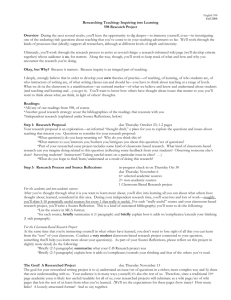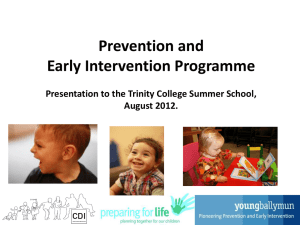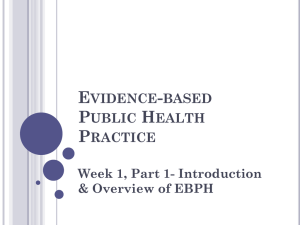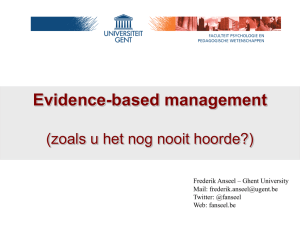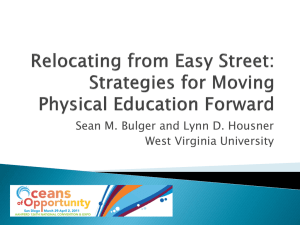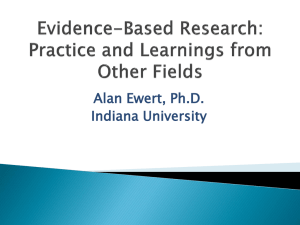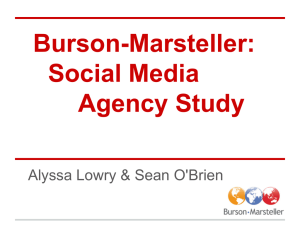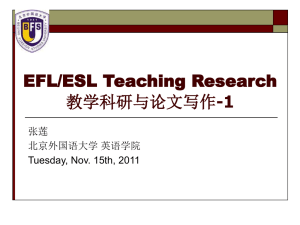*Assessment challenges for teachers as researchers
advertisement
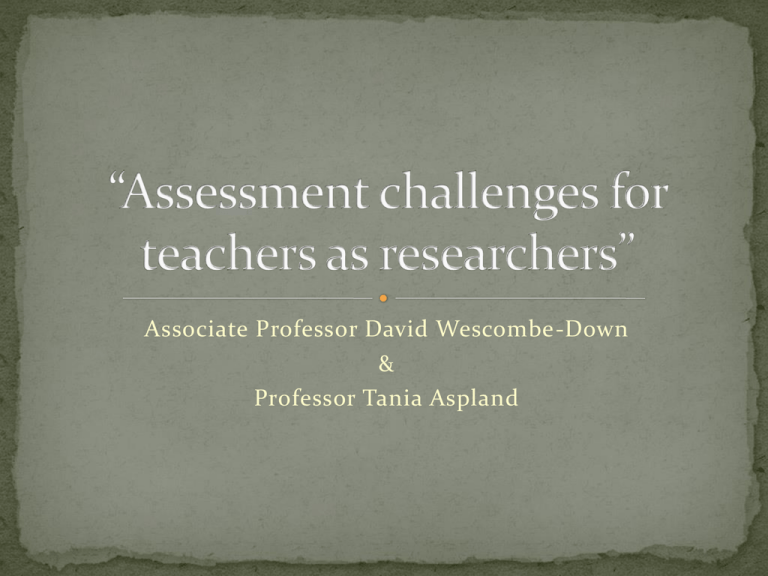
Associate Professor David Wescombe-Down & Professor Tania Aspland At some stage in their careers, the very best educators were active participants in designing & conducting their own classroom-based research to improve what they were doing. Each one took an idea, an untested theory, and applied it as practical teaching. Along the way they acquired a new skill-set & one that would last them a career lifetime: Research skills. In Australia we seek standards-based teaching reform that depends upon setting high standards of learning outcome achievements by all our students. We therefore build on our existing reflective practice platform & embrace evidence-based teaching. Evidence-based learning & teaching contain collections of educational practices that predicate student success. “Educational effectiveness for all students is crucially dependent on the provision of quality teaching by competent teachers who are equipped with effective, evidence-based teaching strategies that work, and the maintenance of high teaching standards via strategic professional development at all levels of schooling”. (p. 2) One element of quality teaching provision is assessment for, and of learning, noting that Groundwater-Smith, Ewing & Le Cornu (2006) suggested: “...assessment innovation lags far behind that of curriculum innovation precisely because teachers have felt confident rethinking the latter but they have been uncertain about how to proceed with the former. The interaction between the two has broken down. The assessment practices are still rooted in a transmission model of teaching in spite of that model having less currency... (p. 273) What an opportune setting to revisit assessment for learning (by students) in tandem with assessment as teaching (by teacher-researchers). The scene is set to contemplate a classroom-based exploration of assessment while preparing for assessment of that process by peers & others: an assessment challenge for teachers as researchers! Assessment for learning takes place when inferences from student progress are used to inform classroom practice. Assessment as learning takes place when teachers reflect on, adjust & monitor their delivery & assessment for learning strategies to inform their future teaching practices. What do I want the students to learn? Why does that learning matter? What am I assessing? Why am I assessing? What assessment criteria am I using? How well do I expect them to do it? How can I help students learn to self assess? How can I improve my teaching? What am I going to get the students to do or to produce? Am I expecting similar achievement for all learners in all contexts? All or any of these questions could be emergent research questions for the teacher-researcher. Whatever the choice, a dual consideration remains: How will I assess for learning while my Teacher as Researcher classroom-based inquiry is being assessed by others from the “assessment as learning” perspective? Portfolio – resource folder or e-portfolio compilation including evaluative, working, showcase & archival types. May include “how I learned” & “what I learned”. It may be a collection of evidence supporting a student’s learning progress by subject, topic, theme or over a particular time period. Portfolios also allow demonstration of learning & achievement. Why not have a fully transportable e-Portfolio that moves with each student, each year from K through 12? e-Portfolios could be set up as Learning Journey experience records from K-12, thus supporting the notion of education being a continuum rather than a string of 13 apparently non-connected year levels. There are research questions ‘begging’ in here!!! Project – may be self-directed, thematic, reflective, expansive or 3-D, including video & audio disc production, booklet design, scripts, charts, collages, song or poetry or short story collection, PowerPoint presentation & CD-ROM production options. Why do we collect all these artefacts & mark them away from the classroom environment in which they were produced? Why do we fill our teaching preparation spaces & offices with stacks of bulky items? Why do we stagger to the car with a pile of large folders to mark at home? Would it be more educative to create a local arrangement for assessing portfolios and projects in the presence of each student, thus enabling them to explain, justify & if necessary, defend their assessment task responses? There are research questions going ‘begging’ in here too! Already we have identified some potential research questions for teachers as researchers to pursue, and when embarking on any such inquiries, the following questions could be asked: What do I want the students to learn? What is the significance of that learning? Why am I assessing? How can I assess “Creativity” & “Effort” in learning? Will I use student self assessment or peer assessment? How well do I expect them to perform? How will the research outcomes inform my teaching? How will I differentiate & negotiate assessment tasks? All or any of these questions not only have potential to be classroom-based inquiry questions in their own right, but they also provide a checklist to underpin assessment as learning when reviewing work of a teacher as researcher. Reflective practice is a precursor to progression into evidence-based teaching, including its assessment & evaluation components. The first step along the path of evidence-based teaching is to have a research question for investigation, and the field of Assessment is an ideal place in which to find one... Knowing that assessment has not received the same treatment dynamic as curricula, teacher-researchers may wish to consider that assessment innovations & refinements may be conceived very effectively in one of the learning crucibles itself: the classroom. Peers & colleagues may then be approached to assess and evaluate your classroom-based inquiry work that is itself exploring the field of assessment for learning. Thus the assessment challenge (duality of assessment) for the teacher as a researcher may be addressed quite simply. This dual process may be quite exciting for some, yet daunting for others to contemplate. “Researchers’ Block” may present as a barrier to becoming involved as a teacher-researcher: what do I research? How? When? What do I look for? What information do I collect? How do I use that data? etc Research familiarity & classroom experience will probably determine how much of a “block” exists. Of particular interest then, is the recent pre-service teacher graduate, being both a Beginning Teacher & a beginning researcher. If you are a Beginning Teacher, or perhaps are mentoring one, they may be internalising many questions about this process at best, self-doubt & apprehension at worst. When entering the activity of a teacher-researcher, allow time for collaborative discussion and related classroom interaction in the duality of assessment of self, and of self by others. You are a “knowledge worker” passing elements and processes of knowledge acquisition backwards & forwards between self, students & an external audience (peers, cluster schools, journal article etc). The suggested skill-set required by teachers as they shift their focus from transmission & measurement to critique & reconstruction or transformation will enable them to: 1. Critique & transform the taken-for-granted nature of assessment of self & others 2. Facilitate the examining of social & cultural constructs of classroom study in relation to assessment 3. Enable transformative action & learning improvement 4. Improve professional practices to better understand assessment of self & others 5. Recognise the uniqueness of the interplay between context, teacher & student 6. Generate assessment data at three levels: subject, teacher & student Identify the research question or statement: keep it ‘narrow’ or ‘simple’ as it will be easier to manage. Draft a mind-map, concept map or flowchart to help differentiate between major & minor concepts, suggest the likely explorations required, evaluate potential concept interest levels, generate keyword/glossary development & assist students select Personal Inquiry questions. Collect evidence from resources that might be useful to the classroom-based research project. Do not forget to immediately record the full reference details of any evidence so gathered. Sort evidentiary references into on-line (2006+) & print- based (2002+) with a balance of both media seen as appropriate at this time. Once the academic rigour of more on-line information sources is achieved, this ‘balance’ is likely to shift. Find a mentor within your school; a colleague to proof-read & evaluate; some peers to assess your investigation; another colleague to act as a research assistant if required. Reflect, reflect & reflect! Continuously explore the project approach & progress, pedagogy, student participation levels, the classroom climate, the whole school learning environment & Learning Triad (student-family-teacher) connections. Make frequent observations & notes during the process. Avoid relying on memory. Communicate effectively with all parties involved, especially your participating students. Discuss the evidence-based inquiries with your students & their families as opportunities arise, since transparency can be a powerful ally. The more involvement, the more ownership & the more likely that healthy participation rates will be achieved. Keep it simple! In the beginning, identify a focus that provides a challenge & is manageable at that time. Build from one small positive outcome to tackle others: as teacher confidence grows, so too will competence in research skills. The concept of dual assessment (or evaluation) in classroom-based research need not be daunting. Each forms part of any inquiry learning journey, and their direct connection to learning & research outcomes actually helps provide ongoing project direction. Anderson, G.L., & Nilhen, A.S. (2007). Studying your own school, 2nd edition. Thousand Oaks, CA: Corwin Press. Elton-Chalcraft, S., Hansen, A., & Twiselton, S. (2008). Doing classroom research: A step-by-step guide for student teachers. Maidenhead, UK: Open University Press. Koshy, V. (2010). Action research for improving educational practice, 2nd edition. London: SAGE Publications Ltd. McIntosh, P. (2010). Action research and reflective practice. Oxford, UK: Routledge. ACER(2006). Evidence-based assessment. http://homepage.mac.com/planclos/portfolio.html Retrieved 08 Jul 11 Groundwater-Smith, S., Ewing, R., and Le Cornu, R. (2006). Teaching challenges and dilemmas, 3rd edition. Melbourne: Thomson. McLeod, J.H. And Reynolds, R. (2007). Quality teaching for quality learning. Melbourne: Thomson Social Science Press.
